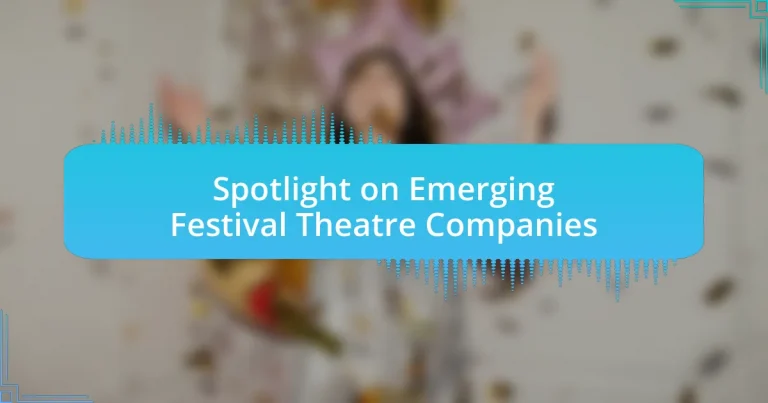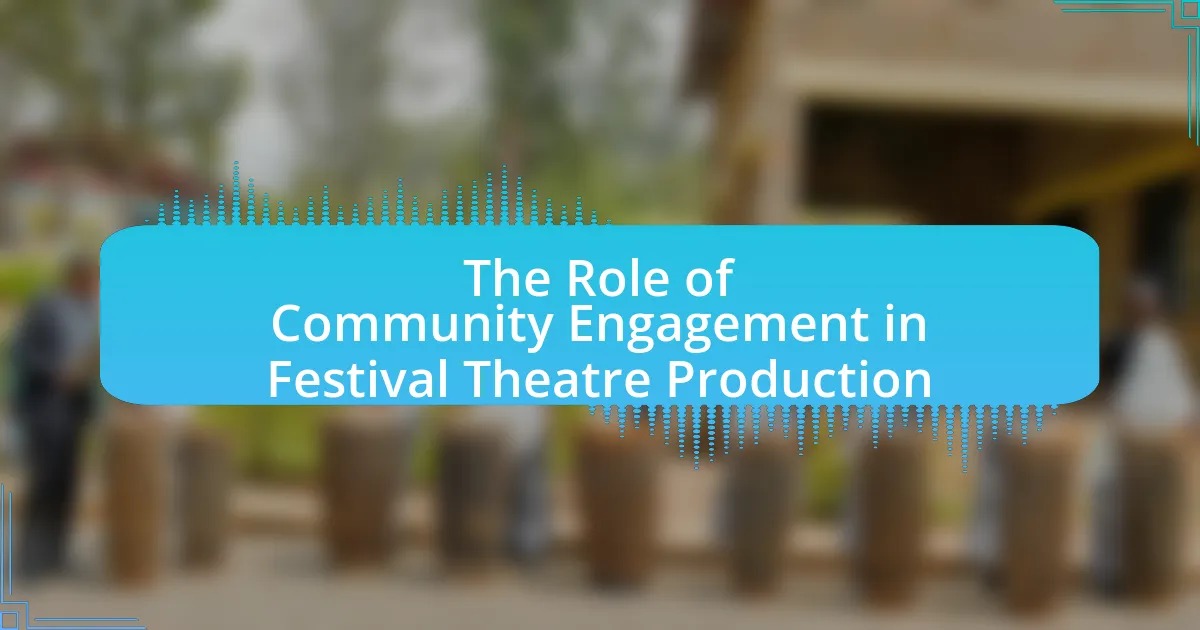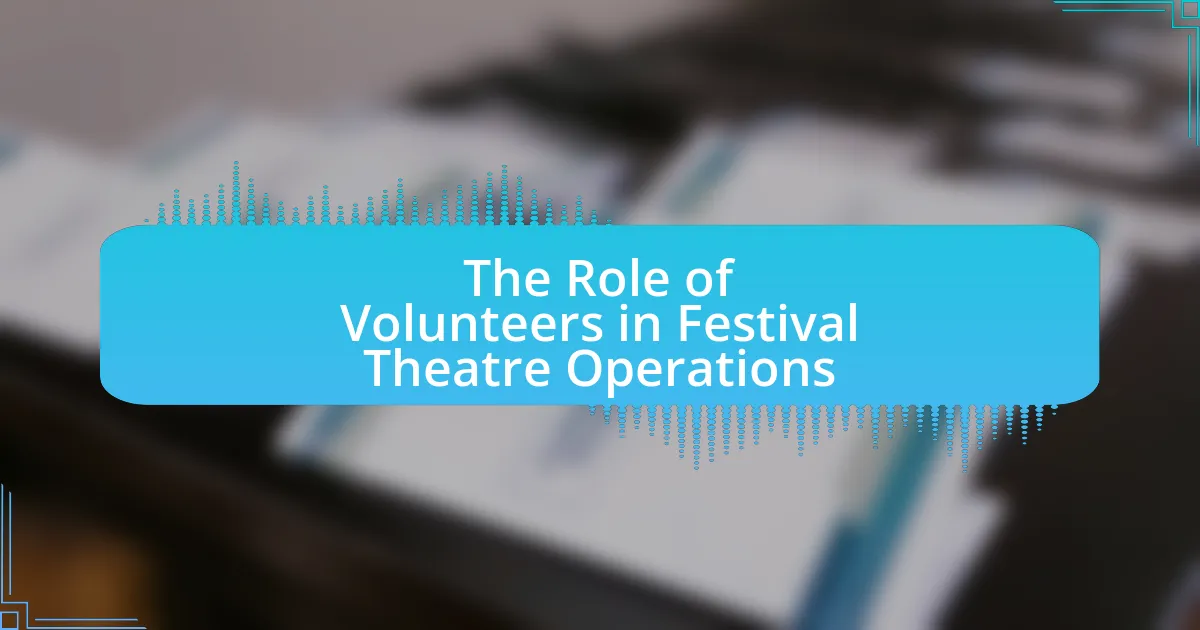Emerging Festival Theatre Companies are newly established organizations that create or participate in festivals to showcase innovative performances and diverse storytelling. These companies prioritize experimental works and underrepresented voices, contributing significantly to the cultural landscape by fostering collaboration and community engagement. The article explores how these companies differ from traditional theatre, their unique characteristics, the challenges they face, and their impact on audience engagement and talent promotion. Additionally, it highlights notable examples, funding sources, and best practices for success within the evolving theatre ecosystem.
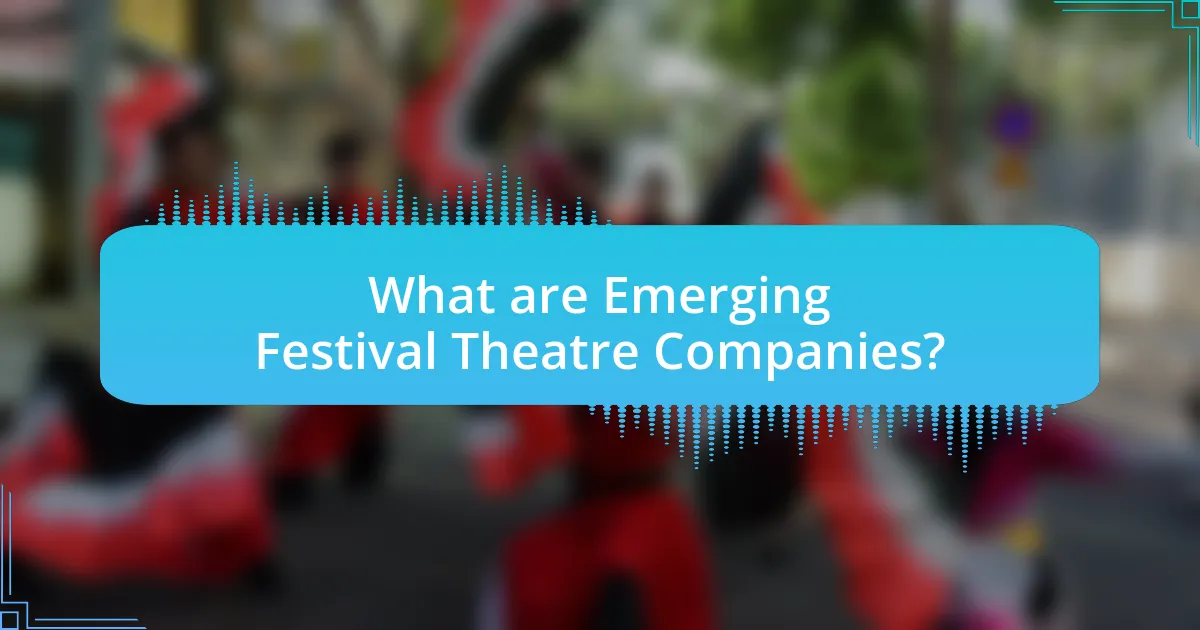
What are Emerging Festival Theatre Companies?
Emerging Festival Theatre Companies are newly established theatrical organizations that participate in or create festivals to showcase innovative performances and new works. These companies often focus on experimental and diverse storytelling, providing a platform for underrepresented voices in the arts. They contribute to the cultural landscape by fostering collaboration among artists and engaging local communities, often supported by grants and partnerships with established festivals. Their role is crucial in the evolution of contemporary theatre, as they introduce fresh perspectives and challenge traditional narratives.
How do Emerging Festival Theatre Companies differ from traditional theatre companies?
Emerging Festival Theatre Companies differ from traditional theatre companies primarily in their focus on experimental and diverse programming. These companies often prioritize innovative, avant-garde performances that challenge conventional narratives, whereas traditional theatre companies typically adhere to established scripts and formats. For instance, emerging companies frequently showcase new works by underrepresented playwrights and engage with contemporary social issues, reflecting a commitment to inclusivity and community engagement. This approach contrasts with traditional companies that may rely on classic plays and established genres, limiting their artistic exploration.
What unique characteristics define Emerging Festival Theatre Companies?
Emerging Festival Theatre Companies are characterized by their innovative approaches to storytelling, diverse programming, and community engagement. These companies often prioritize experimental works and new playwrights, showcasing fresh narratives that reflect contemporary issues. Additionally, they frequently collaborate with local artists and organizations, fostering a sense of community and inclusivity. Their flexible production models allow for adaptability in various venues, enhancing accessibility for audiences. This unique combination of creativity, collaboration, and community focus distinguishes them within the theatrical landscape.
How do these companies contribute to the cultural landscape?
Emerging festival theatre companies contribute to the cultural landscape by introducing innovative performances that reflect diverse narratives and contemporary issues. These companies often prioritize inclusivity and representation, showcasing works from underrepresented voices, which enriches the cultural dialogue. For instance, many emerging companies collaborate with local artists and communities, fostering a sense of belonging and cultural exchange. This engagement not only enhances local cultural identity but also attracts audiences who seek fresh perspectives in the arts. Additionally, by participating in festivals, these companies gain visibility, allowing them to influence broader cultural trends and inspire future generations of artists.
Why are Emerging Festival Theatre Companies important in today’s arts scene?
Emerging Festival Theatre Companies are crucial in today’s arts scene because they foster innovation and diversity in theatrical expression. These companies often provide platforms for underrepresented voices and new narratives, which enrich the cultural landscape. For instance, festivals like the Edinburgh Festival Fringe showcase a wide array of performances from emerging companies, highlighting fresh talent and experimental works that challenge traditional norms. This not only attracts diverse audiences but also stimulates local economies through increased tourism and engagement in the arts.
What role do they play in promoting new talent?
Emerging festival theatre companies play a crucial role in promoting new talent by providing platforms for undiscovered artists to showcase their work. These companies often prioritize innovative and diverse performances, allowing new playwrights, directors, and actors to gain exposure and experience. For instance, festivals like the Edinburgh Festival Fringe have been instrumental in launching the careers of numerous successful theatre professionals, demonstrating the impact of such platforms on talent development. By facilitating networking opportunities and collaborations, these companies contribute significantly to the growth of the theatre industry and the emergence of fresh voices.
How do they influence audience engagement and participation?
Emerging festival theatre companies influence audience engagement and participation by creating immersive and interactive experiences that resonate with diverse communities. These companies often prioritize innovative storytelling and unique performance styles, which attract varied demographics and encourage active involvement. For instance, research indicates that participatory theatre can enhance audience connection, as seen in the work of companies like Punchdrunk, which utilizes site-specific performances to foster deeper emotional responses. This approach not only captivates audiences but also invites them to contribute to the narrative, thereby increasing their investment in the performance.
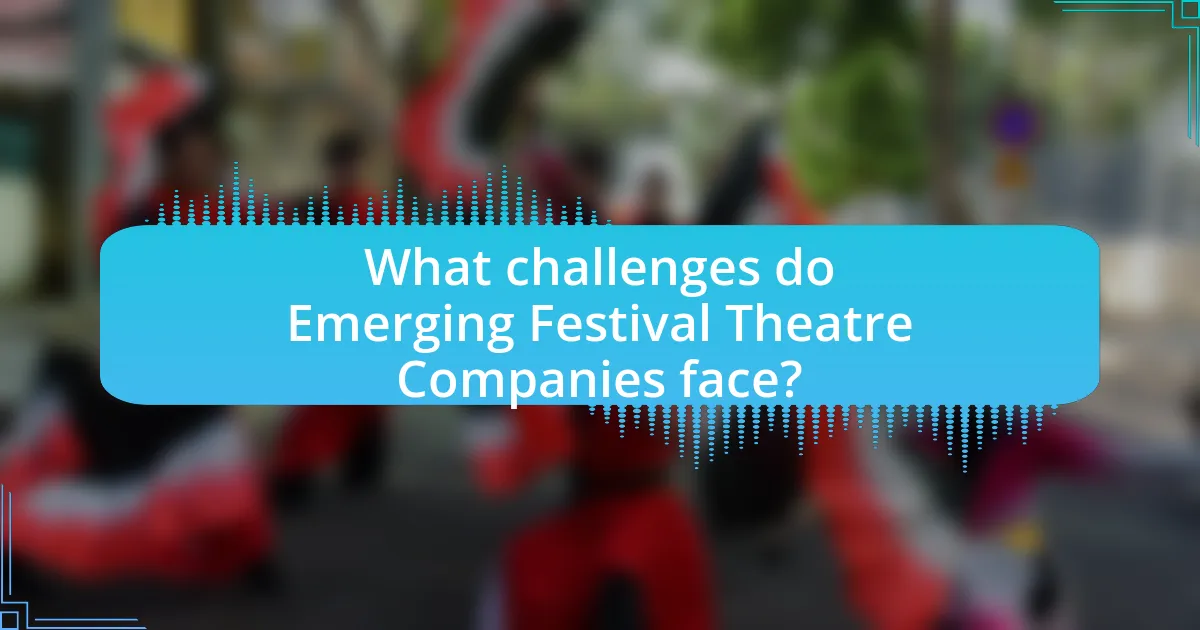
What challenges do Emerging Festival Theatre Companies face?
Emerging festival theatre companies face significant challenges, including limited funding, audience engagement, and competition for resources. Limited funding restricts their ability to produce high-quality performances and attract talent, as many rely on grants and donations that are often insufficient. Audience engagement is crucial, yet these companies struggle to build a loyal following in a crowded entertainment landscape, where established institutions dominate. Additionally, competition for resources, such as venues and sponsorships, further complicates their operational viability, as they often lack the established networks that larger companies possess. These factors collectively hinder their growth and sustainability in the theatre ecosystem.
How do funding and resources impact their sustainability?
Funding and resources significantly impact the sustainability of emerging festival theatre companies by determining their operational capacity and growth potential. Adequate funding allows these companies to secure venues, hire talent, and invest in marketing, which are essential for attracting audiences and generating revenue. For instance, a study by the National Endowment for the Arts found that organizations with diversified funding sources, including grants and sponsorships, are more likely to survive beyond their initial years. Additionally, access to resources such as training and mentorship programs enhances the skills of the workforce, leading to higher quality productions and increased audience engagement. Therefore, the availability and management of funding and resources are critical for the long-term viability of these theatre companies.
What are common funding sources for these companies?
Common funding sources for emerging festival theatre companies include government grants, private donations, sponsorships from local businesses, crowdfunding campaigns, and ticket sales. Government grants often come from arts councils or cultural funding bodies that support the arts, while private donations can be sourced from individuals passionate about theatre. Sponsorships from local businesses provide financial backing in exchange for advertising opportunities, and crowdfunding campaigns leverage community support to raise funds online. Ticket sales generate revenue directly from audiences attending performances, contributing to the financial sustainability of these companies.
How do financial constraints affect their productions?
Financial constraints significantly limit the production capabilities of emerging festival theatre companies. These companies often struggle to secure adequate funding, which directly impacts their ability to hire skilled personnel, acquire quality materials, and invest in marketing efforts. For instance, a study by the Theatre Communications Group found that 70% of small theatre companies reported budget limitations as a primary barrier to producing new works. Consequently, financial constraints can lead to reduced production quality, fewer performances, and limited audience outreach, ultimately hindering the growth and sustainability of these companies.
What are the logistical challenges of operating an Emerging Festival Theatre Company?
Operating an Emerging Festival Theatre Company faces several logistical challenges, including funding, venue selection, and talent acquisition. Funding is often limited, requiring companies to secure grants, sponsorships, or ticket sales to cover operational costs. Venue selection poses challenges due to availability, suitability for performances, and associated rental costs, which can vary significantly. Additionally, talent acquisition is complicated by the need to attract skilled actors, directors, and crew members who may have other commitments, making scheduling and collaboration difficult. These challenges are compounded by the need for effective marketing strategies to reach potential audiences and ensure ticket sales, which are crucial for financial sustainability.
How do venue selection and scheduling affect their success?
Venue selection and scheduling significantly impact the success of emerging festival theatre companies by influencing audience accessibility and engagement. A strategically chosen venue that aligns with the target demographic can enhance visibility and attract larger crowds, while poor venue choices may limit attendance and hinder overall success. For instance, a study by the National Endowment for the Arts found that events held in accessible locations with adequate facilities saw a 30% increase in audience turnout compared to those in less favorable settings. Additionally, scheduling performances during peak times or aligning with local events can maximize audience participation, as demonstrated by festivals that reported higher ticket sales when scheduled during weekends or holidays. Thus, effective venue selection and thoughtful scheduling are critical components that directly correlate with the success of theatre companies in festival settings.
What strategies can they use to overcome logistical hurdles?
Emerging festival theatre companies can overcome logistical hurdles by implementing strategic planning, effective communication, and resource optimization. Strategic planning involves creating detailed timelines and contingency plans to address potential challenges, ensuring that all aspects of production are accounted for. Effective communication among team members, stakeholders, and vendors facilitates smoother operations and quicker problem resolution. Resource optimization includes leveraging technology for scheduling and inventory management, which can streamline processes and reduce costs. For instance, using project management software can enhance collaboration and track progress, leading to more efficient logistical execution.

What are some notable examples of Emerging Festival Theatre Companies?
Notable examples of emerging festival theatre companies include the National Theatre of Scotland, which has gained recognition for its innovative productions and community engagement, and the New York Theatre Workshop, known for its commitment to new works and diverse voices. Additionally, the Edinburgh Festival Fringe showcases numerous emerging companies each year, highlighting fresh talent and experimental performances. These companies contribute significantly to the theatre landscape by pushing creative boundaries and fostering new artistic expressions.
How do these companies showcase innovative performances?
Emerging festival theatre companies showcase innovative performances through unique storytelling techniques, diverse artistic collaborations, and the integration of technology. These companies often experiment with non-traditional narratives and formats, engaging audiences in immersive experiences that challenge conventional theatre norms. For instance, many utilize multimedia elements, such as projections and interactive components, to enhance the storytelling process. Additionally, collaborations with artists from various disciplines, including visual arts and music, allow for a richer, more dynamic presentation. This approach not only attracts a broader audience but also fosters a creative environment that encourages artistic risk-taking and exploration.
What types of productions are commonly featured?
Emerging festival theatre companies commonly feature a diverse range of productions, including original plays, adaptations of classic works, and experimental performances. These productions often emphasize innovative storytelling and unique artistic expressions, reflecting contemporary social issues and cultural narratives. For instance, many festivals showcase works that challenge traditional theatrical forms, incorporating multimedia elements or interactive audience experiences, which are increasingly popular in modern theatre.
How do they incorporate community involvement in their performances?
Emerging festival theatre companies incorporate community involvement in their performances by actively engaging local residents in the creative process. These companies often conduct workshops and open auditions that invite community members to participate as performers, thereby fostering a sense of ownership and connection to the production. For example, many theatre companies collaborate with local schools and organizations to create tailored performances that reflect community stories and issues, ensuring that the content resonates with the audience. This approach not only enhances the relevance of the performances but also strengthens community ties, as evidenced by increased attendance and participation in local events.
What recognition have these companies received in the theatre community?
These companies have received various accolades and recognition within the theatre community, including awards for innovative productions and contributions to local arts. For instance, several emerging festival theatre companies have been nominated for regional theatre awards, highlighting their commitment to diverse storytelling and community engagement. Additionally, some have been recognized by theatre critics in prominent publications for their unique approaches to performance and audience interaction, further solidifying their reputation in the industry.
What awards or accolades have notable Emerging Festival Theatre Companies achieved?
Notable Emerging Festival Theatre Companies have achieved various awards and accolades, including the Fringe First Award, which recognizes outstanding new writing at the Edinburgh Festival Fringe. Additionally, companies like the National Theatre of Scotland have received the Critics’ Awards for Theatre in Scotland, highlighting their innovative productions. The New York Theatre Workshop has also garnered acclaim, winning Obie Awards for excellence in off-Broadway theatre. These recognitions underscore the impact and quality of work produced by emerging theatre companies in festival settings.
How does recognition impact their growth and visibility?
Recognition significantly enhances the growth and visibility of emerging festival theatre companies by validating their artistic contributions and attracting wider audiences. When these companies receive recognition, such as awards or positive media coverage, they gain credibility, which can lead to increased ticket sales and funding opportunities. For instance, a study by the National Endowment for the Arts found that recognized arts organizations experience a 30% increase in audience engagement and a 25% rise in financial support compared to those without recognition. This visibility not only helps in building a loyal audience base but also fosters partnerships with sponsors and other cultural institutions, further propelling their growth.
What best practices can Emerging Festival Theatre Companies adopt for success?
Emerging Festival Theatre Companies can adopt several best practices for success, including building strong community partnerships, focusing on audience engagement, and ensuring financial sustainability. Establishing collaborations with local businesses and organizations can enhance visibility and support, as evidenced by the success of festivals that integrate local culture and resources. Prioritizing audience engagement through interactive programming and feedback mechanisms fosters loyalty and increases attendance, which is crucial for long-term viability. Additionally, implementing diverse funding strategies, such as grants, sponsorships, and crowdfunding, can provide financial stability, as demonstrated by numerous successful theatre companies that have diversified their revenue streams.
How can they effectively market their productions to attract audiences?
Emerging festival theatre companies can effectively market their productions by leveraging social media platforms to create engaging content that resonates with target audiences. Utilizing platforms like Instagram and Facebook allows these companies to showcase behind-the-scenes footage, cast interviews, and audience testimonials, which can enhance visibility and foster community engagement. According to a 2021 survey by the Pew Research Center, 69% of adults in the U.S. use social media, making it a vital tool for reaching potential attendees. Additionally, collaborating with local influencers and community organizations can amplify their reach and credibility, as partnerships often lead to cross-promotion and increased ticket sales.
What collaborative opportunities exist with other arts organizations?
Collaborative opportunities with other arts organizations include co-productions, joint marketing initiatives, and shared resources for events. Co-productions allow emerging festival theatre companies to pool talent and funding, enhancing the quality and reach of performances. Joint marketing initiatives can increase audience engagement and ticket sales by leveraging the networks of multiple organizations. Additionally, sharing resources such as rehearsal spaces, technical equipment, and administrative support can reduce costs and improve operational efficiency. These collaborations can lead to innovative programming and a stronger arts community overall.












